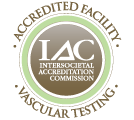IVC Filter
What is an Inferior Vena Cava (IVC) Filter? How Does it Work?
An inferior vena cava (IVC) filter is a mechanical device that helps prevent blood clots from moving across the legs or pelvis into the heart or lungs. The inferior vena cava is the lower of the two large veins that carry deoxygenated blood from the lower and middle part of your body to the right chamber or atrium of your heart. A blockage of this vein is considered life-threatening and must be treated immediately.
Though some smaller blood clots do not pose much risk, a larger blood clot traveling to the lung can result in chest pain, breathing difficulty, a heart attack and long term heart issues. The filter traps the blood clot until the body is able to dissolve it. Patients at risk of developing blood clots may be required to take blood thinning medication as well as have the IVC filter implanted.
How to Prepare for an IVC Filter?
The insertion of an IVC filter involves a medical procedure. It is likely that you will be asked to have a light breakfast or to go without food or liquid prior to the procedure. You may be required to take blood tests to determine if you have any kidney or blood related problems. Unless otherwise mentioned by your doctor, you should continue taking your blood thinning medication before undergoing the procedure.
Types of IVC Filters
There are two types of IVC filters: permanent and retrievable. Your doctor will determine which type of filter is best suited to your needs.
• Permanent filters are left in place in the inferior vena cava in your body. They are placed in patients that have complications with anticoagulation medications or patients who are elderly.
• Retrievable Filters can be removed once the risk of blood clotting has decreased. They are placed in patients that only have a temporary risk of Venous Thromboembolism (VTE), have temporary bleeding problems or are required to stop taking their anticoagulation medications for surgery.
How is the Procedure Performed?
Trained medical staff administers sedative medication and the procedure is performed comfortably and safely. It can take up to 30 minutes and the patient is monitored continuously during this time with advanced equipment.
- The IVC filter will be placed in either the groin or neck to reach the venous system.
- An anesthetic will be injected into the skin to numb the area and prevent pain.
- A catheter (a thin plastic tube) is then placed into the vein (inferior vena cava) for inserting the filter.
- An injection of a liquid dye will enable the vein to show up clearly on the X-ray image to ensure the filter is placed accurately, the filter and vein size are compatible and there is no existing clot in the area.
- Once the filter is inserted, the catheter is removed from the groin or neck.
- Light pressure on the skin site for 2-5 minutes will help to stop the bleeding.
What are the Benefits of an IVC Filter?
IVC filters are beneficial in preventing blood clots in the lungs and heart. No surgical incision is necessary—only a small incision in the skin which does not require stitches. The filter has a high success rate of protecting patients from serious Pulmonary Embolus (PE), a blockage in a lung artery caused by a blood clot in the leg that travels through the bloodstream to the lung.
Are there Any Risks Associated with an IVC Filter?
Implanting an IVC filter is a safe procedure. Allergic reactions to the liquid dye are rare. There is less than a 1% chance of the filter insertion resulting in a collapsed lung, which may require a chest tube and longer hospitalization time. Other risks, though not common, may include:
- Movement of the filter
- Breakage of the filter
- Infection of the filter
- Parts of the filter penetrating through the wall of the vein
- Blockage of the vein if the filter has been in there for a very long time or if it captures very big clots. This may result in higher rates of blood clots in the legs, varicose veins, leg pain or ulceration (a slow healing sore on the skin).
The risks are greater if the filter is in place for a long period of time, which is dependent on how severe the chance of a blood clot is. Patients with filters who experience abdominal pain or shortness of breath should seek urgent medical attention.
Our team at The Vascular Experts can help determine if you are in need of an IVC filter to prevent serious medical conditions related to blood clots. Using the latest technology, our trained professionals can quickly diagnose and treat patients with a high level of preventative care and treatment services. Since our inception in 2001, we have been delivering quality vascular medical and surgical care to the communities of Southern Connecticut and New York. We are one of the largest groups of board-certified vascular surgeons in the country.



